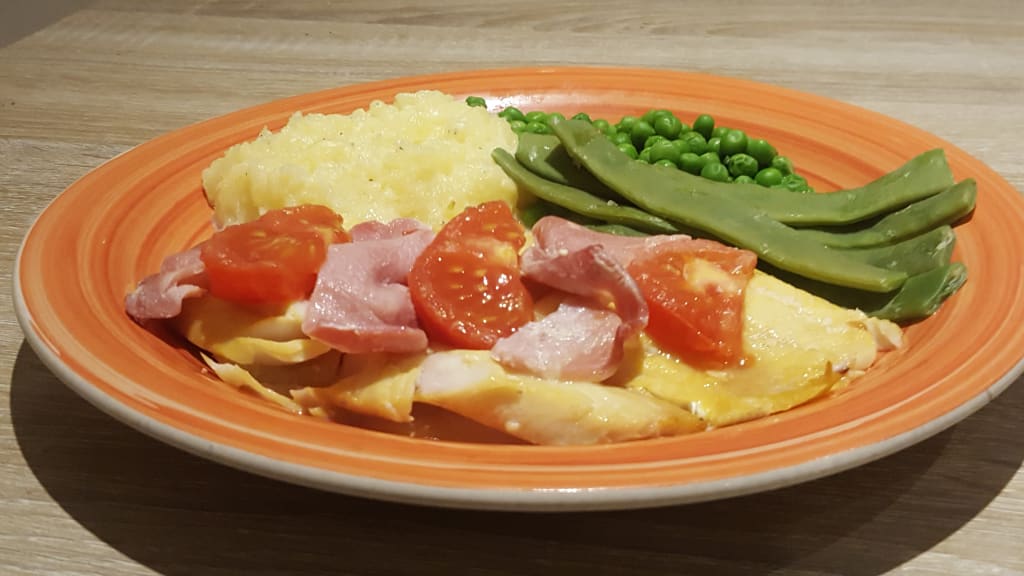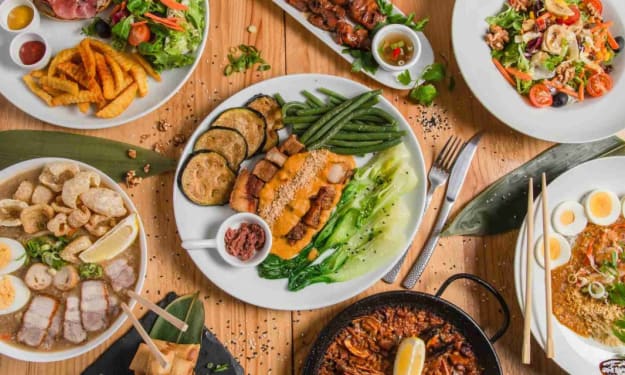Milk-Poached Smoked Haddock
Cooking for Comfort

‘You put garlic in it? Garlic!’
I took an audibly deep breath. My livid, hopeless look caught the eye of a young women sitting opposite me on the bus; an innocent stranger unable to ignore what promised to turn into a full-scale row about some garlic, she quickly averted her eyes, concentrating upon her mobile phone.
‘Why?’ I begged my partner, more quietly, using my own rather outdated device. Unrealistic ideas for sieving out the offending substance from the poached haddock drifted through my agitated mind. My father had always hated garlic. His diet was important, now that his appetite was fading with his illness; it was, then a relief to me when he asked me to cook his favourites; solidly traditional British food, unthreatening, unspiced and unerringly difficult to prepare
These hidebound tastes were not, in fact, a manifestation of prejudice. Although of a generation where a certain xenophobia might be expected, several of his often-told war stories emphasised, quite deliberately, in simple language, that much of the brutality he had seen as a serviceman in North Africa and Germany had been carried out by our own soldiers. The enemy soldiers had mistreated civilians too, of course, but we had by no means always behaved well. There were several remembered episodes of his former life which centred around this. His war reminiscences had been a part of my world since I could remember; pride, sadness, bitterness; mixed up together like a strange recipe.
The lingering vision of a global brotherhood of nastiness, everyone as bad as one another, had in fact been quite a robust base for my own cosmopolitan attitude. I had, perhaps, softened it a little, although in many ways I considered myself just as unsentimental as my father. Now that he was terminally ill, the war stories tended to tail off in the middle, and he was as likely to speak about my mother, who had died of the same illness a few years before. It was, then, her own homely signature dishes which were the only ones which tempted him to eat. Unfortunately, she had been too busy and impatient to teach the recipes to her daughter, a rebellious child with no interest in domesticity. The grown child, still an indifferent homemaker, was presently trying to cope with a new life back in Britain, a foreign boyfriend who could not find work, and a demanding new job which was, with time, to be the basis of a more prosperous future.
The re-creation of what was always known to the family as ‘Yellow Fish’ was supposed to have taken place the night before, after which it would be placed in a plastic container to be conveyed today to my father’s house and warmed in the new microwave. I visited him every two days, after work and alone, as it seemed unfair, I told myself, t to involve my partner in this duty of care. Like many people’s ageing parents, Dad was not an easy man to get along with; he tended to be foul-mouthed when not arrogantly taciturn, and as someone who now needed help with many tasks was quite able to be at the same time punishingly demanding, and absolutely resentful.
Tomato snobbery had held up yesterday’s ‘nostalgia cuisine’ proceedings; the local shop only stocked the cheapest of salad tomatoes, which I was certain tasted of nothing, of water. Although I was admittedly proceeding by guesswork in making the required dish, and although my concern for my father’s condition had by now become more a background than an emotion, a love expressed, as we were never a demonstrative family, solely in the preparation of food, I drew the line at tasteless tomatoes. Now, with my bag of vine tomatoes sitting pungently in the bus dust at my feet, I wondered if the reasoning behind my selectiveness was even true. Another assumption, another cliché? Because when I had told my partner about the insipid tomatoes of modern English supermarkets, I had compared them not to the presumably superior ones of my childhood, but to those of his homeland, the warm place which we had recently and reluctantly left behind. I thought I remembered the tomatoes having more flavour there. Perhaps this too was merely a wistful fantasy.
‘Never look back!’ His retort was unexpected. A formerly easy, close companion who was beginning to feel the strain of our being uprooted, he had responded immediately to my harmless remark with this truism, and then had turned away and repeated the phrase like a mantra, like a new dictum which had become important, and must be upheld. I had stopped speaking abruptly, surprised that he should express something so simplistic and hollow; so damned trite. He was not usually a literal-minded man.
It was, I supposed, the coping mechanism of someone brought up to value success, or least determination, thrown into a prolonged scenario where he had little to do but stand at the sidelines, giving encouragement. A crutch, a staff for his defiance. I rather wished he could have chosen something a little more flexible and humane.
Perhaps today’s sudden initiative had been just that, a heathier kind of revolt against his passive, excluded current existence. I expected no contribution from him in the family matter of our dull food; this however had not stopped me from complaining about the recipes, at length and in frustrated detail. Sulkily, I had described, as I despaired of the tomatoes, their special place upon the milk-baked fish, along with the bacon. I had told him too about the mystery which lurked in the very simplicity of the cooking; of my mother having always placed the whole lot in the oven at the same time, hence surely undercooking the bacon and tomatoes, whilst rendering the fish inedible, a flaky overcooked mess. Yet I was sure that was how it had been done.
Today, ready to perform a hurried experiment with the fish, I had been held up helplessly in a meeting. It was a workshop which I was too new in my job to decline, and attending to it after office hours, whilst worrying about my father’s dinner, had given me a new, worse headache. Stranded two bus rides away in our tiny flat, my partner had therefore carefully created the already-delayed Yellow Fish himself, from my description. It was not, after all, a complex recipe.
He had even gone out and bought the vine tomatoes. We had an excess of them now, the dish only calling for a few slices.
Outside the bus window, an English autumn had coloured the woods in an earthy intricacy, full of unknowns. The contrasting textures and tones of the trees soothed me somewhat, although I could not help thinking that this warming scene would soon be wiped out soon by the first snowfall, its sterile whiteness reducing them all down to the simple and clinical. When one has grown up in poverty, frost and snow are not beautiful, but hostile.
With my sleeve, I automatically wiped condensation from the window, sighing. I could understand that, with a future to design from scratch, my partner was right in not wanting to stifle himself in a maudlin homesickness. But for my father, an independent man who had no expectations now except for the regimented life of a hospital, the concept never looking back was a cruel expectation. He had earned the right to miss his wife, and to re-live a past in which he was not an invalid but a soldier, an actor in history, a part of a squadron of friends. A witness to occasional acts of savagery, and to the fact that cruelty is not the monopoly of any one nation.
I was probably worrying unnecessarily about Dad being upset about his daughter’s choice of fiancé. I had been making assumptions, too, about my fiancé’s choice of phrase the day before; he had never meant to throw it over everything he encountered, smothering nuance and common sense. It was just something to say.
‘Thank you anyway’. I put a smile into my voice. Garlic, though. ‘You haven’t done anything exotic with the mashed potato as well, have you? No dill lurking around? Please, no cumin.’
It must have been hard for him to grasp the plainness of our diet, the narrow culture which made a taboo of something as universal as garlic. When I first left home, I needed to explain to him at some point, I had never tasted a bell pepper, and looked at such things as alien and probably toxic. Rice was for rice pudding, pasta and curry were words used by other people. But within her conservative limits and our tiny budget, my mother’s cooking was extraordinary.
‘No, no more additions, but why anyone puts bacon with fish is beyond me. And without garlic, the sauce is just salty, fishy milk.’
‘Well yes. That’s the idea, I think. As I remember it.’
Laughter. ‘I cooked enough for three, maybe I could come along with you tonight, see how he is?’
Much to my own surprise, I felt the prickle of tears, and that uncomfortable dry feeling in the throt which accompanies them. I agreed rather gruffly, then struggled to apply some fresh makeup, as the bus swayed and jolted. I had become used to doing everything alone.
I was hungry by the time we arrived, and after doing a few of my father’s neglected chores, I heated the Yellow Fish, with its with bacon, tomatoes, milk and something else not to be mentioned, in the shiny new microwave. The plates steamed and the aromas of haddock and bacon permeated the kitchen; I could in fact imagine, now, my mother bending over the table in her grubby apron, ladling mashed potato onto the plates. I had dolloped everything onto them beforehand, so that the area of mash had somewhat blended with the rest of the food at its borders. It was like an aerial photo of an eroded shoreline. Peas, quickly defrosted, straggled randomly across the plates.
‘Takes me right back.’ A relaxed smile appeared on my father’s gaunt face, as he piled up another forkful and ate. Often, I had trouble persuading him to ingest a mouthful of meal-replacement soup. A conspiratorial look passed across the table.
‘How is the sauce?’ I asked nervously.
‘Bloody delicious. Just exactly right. Tastier, actually, than I remembered…’
The new sauce, to which a more generous amount of butter and a little flour had also been added, was thicker, livelier. Less soggy, it kept a polite distance from the firm fish with its contrasting bacon, which had been grilled separately. The grilled tomatoes melted sweetly.
In some dishes, garlic, like salt, acts merely to bring out the best in the existing flavours. Perhaps, too, the last time this long-lived man had consciously tasted garlic had long slid past the limits of his memory. Hating it was just another dictum or mantra; a defence perhaps against another generation’s inevitable pressures; we resent those who wish to change us. And so we didn’t mention the small garlic accident, leaving him the dignity of his own minor boundaries. We had no intention of amusing ourselves at his expense.
‘Proper tomatoes too, not those bloody watery ones.’ The old man added, wiping a slick of tomato skin from his stubble.
‘Hard to find at the moment. It’s always worth looking for the best.’
My partner and my father, two men as different as chalk and cheese, or as haddock and bacon, now fell to talking with some animation about different types of tomato. I had somehow been unaware that there were any varieties.
It had been a long day, and it would be a long winter ahead, but as I carefully peeled the second rasher of bacon away from the fish which it complemented so well, I understood that there would be more moments like this to ease the way, and to make worthwhile the commitment which we both felt towards adding some joy to Dad’s last months. I found myself looking, then, at the stove in that kitchen, the same one my mother had used. It was archaic, with just two gas rings, a grill set above them, a small oven. Without a microwave, the two rings would have been for the potatoes and the peas. The grill would have held the bacon and tomatoes; the fish, by default, would have to have been baked in the oven.
Ingredients
Two or three fillets of smoked haddock; my mother’s recipe always used the yellow dyed fish, but white ones will taste identical.
Six rashers of thin-cut, unsmoked bacon.
Two quality fresh tomatoes
One and a half cups of milk
A knob of butter
White pepper or cayenne to taste
Two cloves of garlic (optional)
Mashed potato and green vegetables such as peas or green beans to serve.
Yellow Fish is a very simple dish to make, but it is warming, filling and full of unusual flavours. It makes good use of the full-on taste of haddock. I hope my dated recipe will make new memories for a very different generation.
The nostalgic reproduction of an old-time dish was my duty, however, and not yours. By all means replace the frozen peas with some steamed pak-choi, the mashed potato with colcannon, or try adding a bit of wine; be inventive. Although I have written about contrasts, it is still a somewhat sloppy meal, apart from the bacon; try a crunchy side dish. Some garlic bread, perhaps…
(Note to the story: My father was a British veteran of the Second World War. To clarify, he joined the army at 18 and was sent immediately to the front. In later years he married his second wife, my mother, and was already in his fifties when I was born. This story is set more than twenty years ago, shortly before he passed away in his sleep at the age of 82.)






Comments
Claire Manojlovic is not accepting comments at the moment
Want to show your support? Become a pledged subscriber or send them a one-off tip.